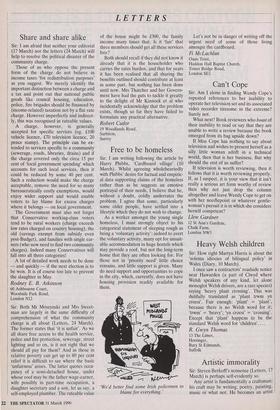LETTERS Share and share alike
Sir: I am afraid that neither your editorial (17 March) nor the letters (24 March) will help to resolve the political disaster of the community charge.
Those of us who oppose the present form of the charge do not believe in income taxes 'for redistribution purposes' as you suggest. We merely identify the important distinction between a charge and a tax and point out that national public goods like council housing, education, police, fire brigades should be financed by (income-related) taxation not by a flat rate charge, However imperfectly and indirect- ly, this was recognised in rateable values.
A charge, however, is generally accepted for specific services (eg. £100 vehicle licence, £70 television licence, 20 pence stamp). The principle can be ex- tended to services specific to a community (sewerage, roads, libraries, drains) and if the charge covered only the circa 15 per cent of 'local government spending' which accounts for such local services, then it could be reduced by some 40 per cent. Such a reduction would make the charge acceptable, remove the need for so many bureaucratically costly exemptions, would enjoy wider support and would enable voters to lay blame for excess charges where it belongs — on local.government.
The Government must also not forget that Conservative working-class voters tend to be rural workers (charge exceeds low rates charged on country housing), the old (savings exempt from subsidy even post-Budget), and families with single ear- ners (who now need to find two community charges). Indeed many Conservatives will fall into all three categories!
A lot of detailed work needs to be done — and quickly — if the next election is to be won. It is of course too late to prevent the slaughter in May.
Rodney E. B. Atkinson
60 Ashbourne Court, Woodside Park Road, London N12


























































 Previous page
Previous page